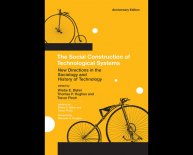
Social Construction of Technology theory
 Technological development affects the way we live and connect to the planet on a deep amount. Technological artifacts like computers and automobiles dictate just how our culture functions and exactly how we relate to one another. These impacts are pervading throughout our daily life so it’s often tough to imagine things being other way. Technology is observed as an inevitable, ever-advancing section of our society. We see it as very nearly a force of nature.
Technological development affects the way we live and connect to the planet on a deep amount. Technological artifacts like computers and automobiles dictate just how our culture functions and exactly how we relate to one another. These impacts are pervading throughout our daily life so it’s often tough to imagine things being other way. Technology is observed as an inevitable, ever-advancing section of our society. We see it as very nearly a force of nature.
This deterministic perspective may be see in how we represent technology in videogames. As I’ve discussed in some past posts, the technology tree presents a very deterministic means of comprehending technical development. Technologies are always online, waiting to-be discovered. It’s not a matter of if your civilization will establish metallic, it is simply a concern of whenever. Some games, like Master of Orion, subvert numerous deterministic presumptions by giving a far more complex understanding of technological development. While more nuanced with its designs than a number of other games, Master of Orion doesn't totally escape deterministic thinking. Scientific progress, which is run on industrialism, continues to be the primary driving force in the game, strengthening the player militarily and enabling this lady to reach a lot more remote planets. Whilst the game does deal with dilemmas of ecology and pollution, these types of dilemmas tend to be portrayed as strictly technical issues, versus personal issues. Every problem into the game has actually a technological option.
It’s not a matter of if your civilization will establish metallic, it is simply a concern of whenever. Some games, like Master of Orion, subvert numerous deterministic presumptions by giving a far more complex understanding of technological development. While more nuanced with its designs than a number of other games, Master of Orion doesn't totally escape deterministic thinking. Scientific progress, which is run on industrialism, continues to be the primary driving force in the game, strengthening the player militarily and enabling this lady to reach a lot more remote planets. Whilst the game does deal with dilemmas of ecology and pollution, these types of dilemmas tend to be portrayed as strictly technical issues, versus personal issues. Every problem into the game has actually a technological option.
 In technology scientific studies, there is eventually a reaction against deterministic ideas of technical development. Some scholars that has originate from the field of research researches began applying the techniques that they had familiar with study scientists employed in the laboratory into designers and creators who produced new technological items. The effect was an approach that viewed the social causes that shaped the way technology was developed. This brand-new concept, called the Social Construction of Technology (or simply SCOT), would profoundly affect the way in which we understand our relationship with technology.
In technology scientific studies, there is eventually a reaction against deterministic ideas of technical development. Some scholars that has originate from the field of research researches began applying the techniques that they had familiar with study scientists employed in the laboratory into designers and creators who produced new technological items. The effect was an approach that viewed the social causes that shaped the way technology was developed. This brand-new concept, called the Social Construction of Technology (or simply SCOT), would profoundly affect the way in which we understand our relationship with technology.
Among classic types of exactly how social forces shape technology is Trevor Pinch and Wiebe Bijker’s (1987) analysis of the improvement the modern bicycle. As many folks understand, the bicycle changed significantly through the 19th century. The unwieldy penny-farthing bikes fundamentally provided way to the greater amount of familiar chain-driven rubber-tired devices that people still make use of these days. frequently, we framework this change as an easy narrative of progress – a substandard design had been sooner or later changed with a safer, more cost-effective design which was merely better. In actuality, this will be definately not the truth.
frequently, we framework this change as an easy narrative of progress – a substandard design had been sooner or later changed with a safer, more cost-effective design which was merely better. In actuality, this will be definately not the truth.
As Pinch and Bijker note, the development of the bike was not a linear genealogy of incremental improvements. Rather, it was an explosion of varying and often contradictory tips. Some folks consented there were issues with the ordinary penny-farthing bike, there clearly was no consensus on how to fix these issues, and even what the issues had been. Numerous groups, for instance, resisted the application of pneumatic tires. Although having air-filled tires made cycle operating much more comfortable, especially over landscapes like cobblestone, they also required considerable upkeep and had been prone to slipping in dirt. Some groups disliked them simply because they were ugly. As different social teams identified different dilemmas and solutions, a big variety of bikes appeared, many very unlike that which we see these days.

















